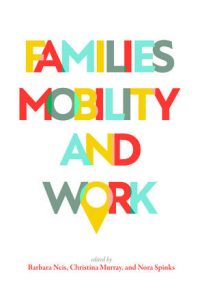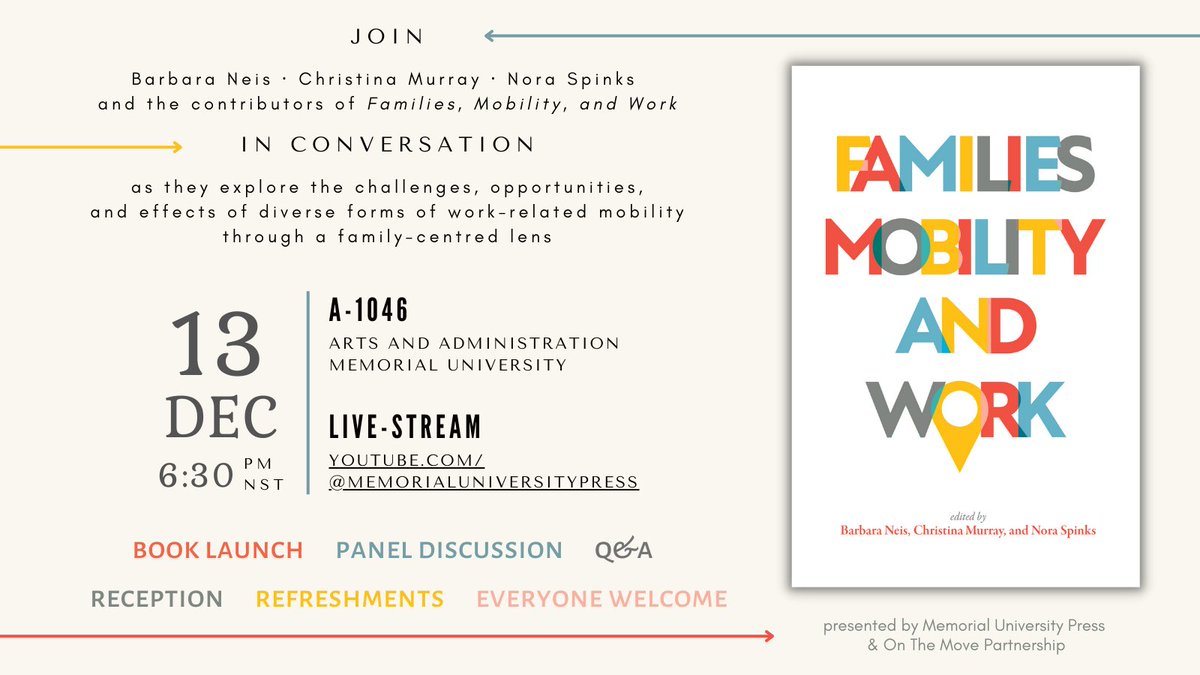On the Move Partnership
Mobility for work is not new, but it is changing.
Across the world a wide range of people are mobile for work – women and men, citizens and temporary foreign workers, new workers and those near retirement. From hours-long daily commutes, to travel that takes workers away from home for days, weeks, months and even years; from mobility within work (truck driving, shipping and others) to mobility to get to and from work; from cars and buses, to trains, ships and planes; from highly-paid top executive jobs, to minimum-wage service jobs; from natural resource dependent industry to natural wonder dependent tourism – the types of mobility are many and changing.
The On the Move Partnership is a multi-year national scale research program with international links, investigating employment-related geographical mobility and its consequences for workers, families, employers, communities, and Canadian municipal, provincial and federal governments.
Partenariat en mouvement
La mobilité pour le travail n’est pas nouvelle, mais elle est en évolution.
À travers le monde, une vaste gamme de personnes se déplacent dans le contexte de leur travail: femmes et hommes, citoyennes et citoyens, travailleuses étrangères temporaires et travailleurs étrangers temporaires, nouvelles travailleuses et nouveaux travailleurs, ainsi que celles et ceux approchant la retraite. Des longues heures passées quotidiennement à faire la navette jusqu’au travail, aux emplois qui éloignent les personnes qui travaillent loin de leur domicile pendant des jours, des semaines, des mois et même des années; des voitures et des bus, aux trains, bateaux et avions; des postes bien rémunérés de hauts dirigeants, aux emplois tertiaires gagnant le salaire minimum; de l’industrie dépendante des ressources naturelles, à l’industrie touristique dépendant des merveilles naturelles – la gamme de la mobilité géographique pour le travail est large et dynamique.
Le partenariat en mouvement est une étude de recherche d’une durée de 7 ans avec des liens internationaux. Cette étude de recherche examine la gamme complète des situations de mobilité géographique pour le travail et ses conséquences pour les personnes qui travaillent, leurs familles, les employeurs, les communautés et les paliers municipaux, provinciaux et fédéral du gouvernement canadien.


New publication: Families, Mobility, and Work, edited by Barbara Neis, Christina Murray, and Nora Spinks.
Published by Memorial University Press, Families, Mobility, and Work is “an engaging and expansive collection exploring the intersection between family lives and work-related mobility,” and features contributions from On the Move team members.
Barb Neis, co-editor and On the Move Project Director, discussed the origins of this collection, and the continued impact of work-related mobility on families and communities in an interview with Nathan Battams from the Vanier Institute. The full interview is available here.
Families, Mobility, and Work is available now in print and as an open access volume.

Missed the book launch? A recording of the panel discussion is available here.

Over the past few years, COVID-19 has drastically disrupted everything from the global economy to everyday life. Key features of the pandemic include its impacts on the world of work. For the past 8 years, the On the Move Partnership has been studying the mobile labour force, the estimated 16% of the Canadian labour force that engages in extended/complex mobility to and within work. Constraining and managing mobility of all kinds is a core feature of pandemic response. Politicians and chief medical officers tell us on a daily basis to go home and stay home. The result has been massive layoffs and widespread unemployment, as well as an increase in working from home, primarily among white collar workers. The mobile labour force is partially comprised of millions of transportation, health, agricultural, construction and other types of workers whose work is deemed essential and who are thus still on the move. In Canada and elsewhere, pandemic planning initially paid little attention to these workers. The result was often serious effects of travel bans, boundary closures and quarantine requirements, coupled with lack of attention to their risk of infection on their lives, their health and their ability to get to and do their jobs. More recently, a series of post hoc initiatives have been taken intended to, on the one hand, allow workers deemed essential to moving goods and people, providing essential care and sustaining infrastructure, to keep moving while, on the other hand, minimizing the risk their mobilities pose to themselves, other workers, and particularly to clients and the general public.
We have argued since the beginning of On the Move that greater understanding of how extended/complex mobility for work affects workers and their families, employers, source and hub communities is essential to Canadian and indeed global prosperity. It is also essential to ensuring effective pandemic planning and management that is also just in that it does not unnecessarily threaten the lives and livelihoods of these workers, their families and their communities.
It is in this context that we are launching our COVID-19 and the Mobile Labour Force series. The series begins with a working paper that brings together insights from relevant media coverage with insights from On the Move research across multiple sectors and groups to highlight key developments and issues and to be used as a resource for future work. This working paper is linked to a series of blogs done by On the Move co-investigators and others and focused on particular sectors and issues.
The series includes:
● Mobility in a Pandemic: COVID-19 and the Mobile Labour Force, Working Paper, by Barbara Neis, Lesley Butler, Kerri Neil, and Katherine Lippel
● COVID-19 and the Mobile Labour Force by Barbara Neis, Kerri Neil, and Katherine Lippel, in Routed magazine
● How COVID-19 Has Impacted Offshore Workers in Norway by Marit Aure
● COVID-19 and Coastal Fishing Communities by Gale Burford
● COVID-19 and (Im)Mobile Workers in Alberta’s ‘Essential’ Oil Industry by Sara Dorow
● The Impact of the COVID-19 Pandemic on Canadian Truck Drivers by Natasha Hanson and Kerri Neil
● COVID-19 and the Plight of Informal Cross Border Traders in Zimbabwe: Working Paper by Denboy Kudejira
● COVID-19 and the Plight of Informal Cross Border Traders in Zimbabwe: Summary by Denboy Kudejira
● Temporary and Precarious Migration Status and the Experience of the Pandemic in Canada’s Health Care Sector: Emerging Themes by Shiva Nourpanah and Kerri Neil
● A Virus That Doesn’t Discriminate? by Stephanie Premji
● People Who Carry Food and Fuel for the World are Trapped at Sea: A Crewing Crisis in the Context of COVID-19 by Desai Shan
● Stranded at Sea in the COVID-19 Crisis by Desai Shan
● Walking the Empty City: Feminist Reflections on Life Suspended under COVID -19 by Deatra Walsh

